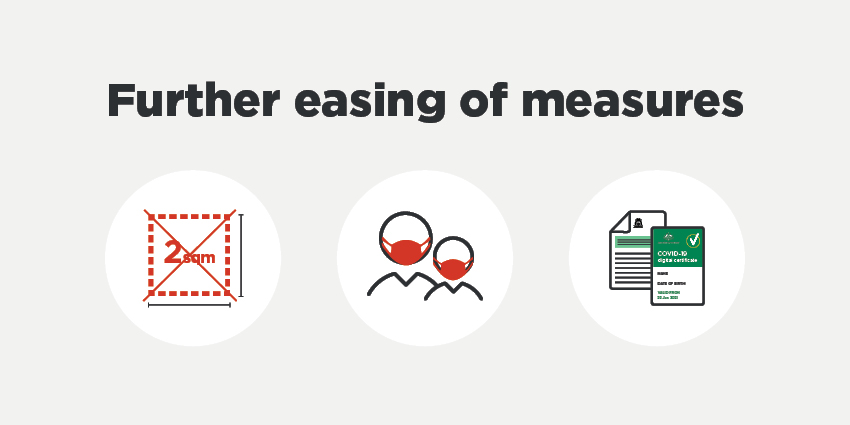
Thanks to the efforts of the WA community, public health and social measures will ease from 12:01am, Friday 29 April, as Western Australia’s soft landing through the Omicron wave has been secured. Based on the latest health advice, WA reached its COVID peak four weeks ago. With hospitalisation rates, intensive care units, and COVID-19 infections lower than anticipated, public health and social measures can safely ease.
The following will take effect from 12.01am, Friday 29 April:
Masks
- No longer mandatory except for high risk settings for people aged 12 years and older (including year 7s) in the following settings:
- on public transport, in taxis and rideshare vehicles and other passenger transport
- airports
- hospitals, residential aged care and disability service facilities, and correctional facilities.
- Masks are encouraged where physical distancing isn’t possible.
Close contacts
- Close contacts with no symptoms are not required to isolate for 7 days, but must:
- undertake a daily Rapid Antigen Test and obtain a negative result
- wear a mask when leaving the house,
- avoid high-risk settings, including hospitals, healthcare settings, aged care facilities, residential care facilities (including disability care facilities and mental health residential facilities) and correctional facilities unless they work at these locations. Relevant workers entering high risk settings are subject to additional obligations.
- They are also strongly encouraged to:
- avoid non-essential gatherings and contact with people at risk of severe illness
- work from home, where possible
- notify their employer/educational facility of their close contact status.
- Close contacts with no symptoms who work in a high-risk setting must also:
- advise their employer they are a close contact
- seek confirmation from their employer to attend work
- monitor for symptoms
- immediately leave the workplace and return home if they develop symptoms or become COVID positive
- only enter or remain at the high-risk setting for the purposes of their work duties
- wear a surgical mask while at work along with any PPE requirements from their employer
- not share break areas at work with any other person
- maintain physical distancing
- Close contacts with symptoms must continue to isolate until symptoms resolve and get tested as per existing protocols.
- If a close contact tests positive, they must isolate for a further 7 days as per arrangements for positive COVID-19 cases.
Density and capacity limits
- The 2 square metre rule removed for venues and businesses
- Capacity limits removed for all entertainment venues, stadiums and events
Proof of COVID-19 vaccinations
- No longer required to enter venues and businesses
- Still required to visit hospitals and residential aged care facilities
- Mandatory workplace vaccination requirements will remain in place.
Travel
- G2G Pass registration no longer required
- Triple dose vaccination no longer required for interstate arrivals
- Double dose vaccination requirement for international arrivals will continue as per Australian Government requirements
- Unvaccinated Australian international arrivals to continue to quarantine for 7 days
- Travel to remote Aboriginal communities remains restricted.
Hospitals
- Two visitors permitted per patient per day
- Essential visitors are also allowed at hospitals for compassionate reasons, birth partners, carers/parents/guardians etc.
- Visitors are required to show proof of COVID-19 vaccinations and wear a mask.
Residential aged care and disability care facilities
- Two visitors permitted per resident per day
- Masks must be worn by staff and visitors indoors and outdoors
- Visitors are required to show proof of COVID-19 vaccinations at residential aged care facilities.
COVID Safety and Event Plans
- No longer mandatory but still encouraged
Schools and early childcare
- Remaining public health measures in place removed
- Some preventative measures retained in schools including enhanced ventilation, mandatory vaccination and cleaning
- 12 million free RATs provided to all schools and childcare facilities to distribute to parents and carers
- Parents and students will be encouraged to collect tests, to ensure they are ready to test their children if symptoms develop.


